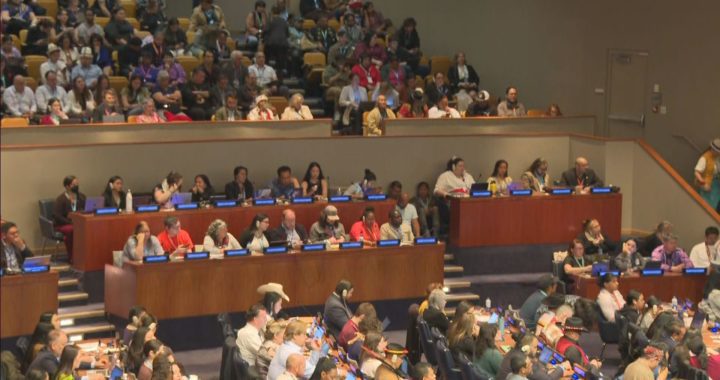A desperate plea today from a northern chief in Saskatchewan Wednesday as she re-instated a state of emergency in her community.
Norma Catarat of the Buffalo River Dené Nation first issued a state of emergency in June citing escalating violence.
She’s calling on the federal and provincial governments to help them deal with the drug and gang violence after two female elders were physically assaulted in separate incidents last weekend.
“The gangs and the drugs have come to a point in my community where my community is living in fear. People are feeling powerless-the gang violence, the drug war, the crystal meth,” Catarat told reporters at a news conference called by the Federation of Sovereign Indigenous Nations (FSIN).
“A person in psychosis is very unpredictable, and I thank the Creator today that our elder survived.”
Catarat says the elder was traumatized and suffered broken ribs and bruised collarbones and has not returned to the community.
A woman in her late 20s who was not related to the elder allegedly committed the assault at random.
According to Catarat, another elderly woman was reportedly attacked in a nearby community in an unrelated incident.
APTN News reached out to the RCMP to see if any arrests had been made but didn’t hear back by the time this story was published.
FSIN Chief Bobby Cameron said policing and safety are treaty rights and he wants a First Nation police association implemented.
Cameron said the federal government seems to understand there’s a sense of urgency with the violence that’s happening, but he said now is the time for “action and implementation.”
He said the crisis of gangs and drugs is happening in every First Nation.
“The state of emergency is real in First Nation country. It’s an everyday thing, it’s a weekly thing. It happens on the 20th of every month, and the 30th of every month,” Cameron said.
“There’s a state of emergency every single month where meth dealers and other dealers are selling crack and cocaine and crystal meth and heroin to 10-year-old children.”
Meadow Lake Tribal Council Chief Richard Ben said violence from gangs and drugs and incidents like the recent tragedy at James Smith Cree Nation could happen in any First Nation community.
“Why do our communities have to issue a state of emergency for us to be heard? I went to her community and you know, there are three different types of gangs there. No one says nothing-cause it’s normal. They’re driving around, they’re picking up kids, they’re using our kids to sell their drugs,” Ben said.
“As long as they stay on the reserve, then it’s not our problem, that’s the attitude we get a lot.”
Ben said First Nation communities need to be able to build capacity, but justice initiatives are underfunded by the Federal government.
FSIN vice-chief Heather Bear echoed this sentiment, saying many communities are in crisis.
“They’re releasing inmates coming out into the nations when the first nations are saying no, we don’t have the capacity here. We don’t have addictions support, we don’t have mental health support, yet the justice system continues releasing them to our communities,” Bear said.
She also cited lengthy response times to emergencies such as the stabbing rampage at James Smith Cree Nation where it took 40 minutes for help to arrive. Bear said Buffalo River needs help now, not later.
“Their school, their children deserve to be safe from gangs and I call on the gangs to please stop what you’re doing and quit selling death to our people,” Bear said.
“I plead with you, we’ve gone through so much-too much as Indian people.”









